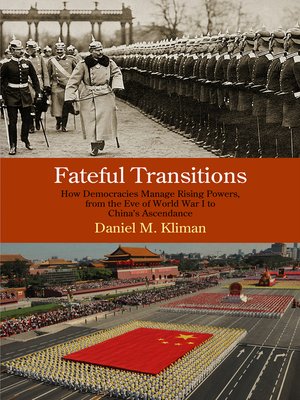Fateful Transitions
ebook ∣ How Democracies Manage Rising Powers, from the Eve of World War I to China's Ascendance · Haney Foundation Series
By Daniel M. Kliman

Sign up to save your library
With an OverDrive account, you can save your favorite libraries for at-a-glance information about availability. Find out more about OverDrive accounts.
Find this title in Libby, the library reading app by OverDrive.



Search for a digital library with this title
Title found at these libraries:
| Library Name | Distance |
|---|---|
| Loading... |
As China emerges as a global force in the twenty-first century, questions of how existing great powers will navigate the geopolitical transition loom large. In Fateful Transitions, Daniel M. Kliman revisits historic power shifts to shed light on enduring patterns in international relations, demonstrating that the regime type of ascendant powers greatly influences global interactions.
Since the late nineteenth century, the world's major democracies have tended to accommodate or conciliate ascendant democratic states. Certain attributes of democracy, such as a free press and domestic checks and balances, encourage trust during power shifts, whereas closed and autocratic regimes on the ascent tend to produce a cycle of suspicion, competition, and confrontation. Drawing on democratic peace theory and power transition theory, Kliman compares Great Britain's embrace of U.S. ascendancy in the early twentieth century to its confrontational stance toward autocratic Germany and later U.S. mistrust of the Soviet Union. Within this geopolitical context, he evaluates the interactions between China and current great powers, the United States and Japan. Building on this analysis, Kliman offers new insights into the dynamics of power shifts and explores their implications for how today's established and emerging powers can successfully navigate fateful transitions.







